
Those hoping and praying for an 'iTablet'—the mythical chimera begotten from an overzealous iPhone and a lonely MacBook—may have to wait six months or more for their dreams to be realized. Recent analysis from Piper Jaffray analyst Gene Munster suggests such a device might be coming, but not until sometime in the first half of next year.
Rumors and speculation of a Mac-based tablet go back further than our CMS's database, but I dug one up from as far back as four years ago. Numerous patents have hinted at technology that would make such a device possible, and, even as recently as last month, rumors circulated that Steve Jobs continued to keep an eye on development of such a product while on medical leave from official CEO duty.
Tech — Hurdles still exist for much-ballyhooed Mac tablet Apple has all the technical know-how in place to create an iPhone/Mac hybrid, Chris Foresman - May 21, 2009 7:59 pm UTC. Though you honestly think debian is a better desktop system than mac os x It's a better server - it's much easier to manage updates and installs of new server software, has many more applications ported to packages, has a full package managment system, a much more powerful firewall (in the form of iptables) and it will perfom far better than. Download LonelyScreen for Mac to mirror anything from your iOS devices to your desktop. Music, movie or screen.
The latest analysis from Munster gathers a number of pointers, including the aforementioned patents, statements (of derision) from Apple concerning the current state of netbook-class products, Apple's own in-house chip designers, and recenthiringpatterns, concluding that Apple is working on such a device. But Munster's analysis, which happens to agree with BusinessWeek's own source on the matter, suggests the product won't appear before 2010.
As Munster states:
Keep Your Connection Secure Without a Monthly Bill.Get a lifetime subscription to VPN Unlimited for all your devices with a one-time purchase from the new Gadget Hacks Shop, and watch Hulu or Netflix without regional restrictions, increase security when browsing on public networks, and more. Buy Now (80% off) Other worthwhile deals to check out: 41% off a home Wi-Fi analyzer. Shop MAC In The Flesh x 15 Eye Shadow Palette online at Macys.com. A carefully edited palette of 15 iconic neutral shades, perfect for a classic nude look. The highly pigmented powder applies evenly, blends well. Available in a variety of textures and finishes.
We are anticipating a new category of Apple products with an operating system more robust than the iPhone’s but optimized for multi-touch, unlike Mac OS X. The device’s OS could bear a close resemblance to Apple’s mobile OS and run App Store apps, or it could be a modified version of Mac OS X. We expect the development of such an OS to be underway currently, but its complexity, along with our conversations with a key company in the mobile space, leads us to believe it will not launch until CY10.
This is the real crux of the issue. If Apple is indeed preparing a touch-based tablet, the OS and the UI will be some kind of blend of Mac OS X and iPhone OS. That's no trivial task—where will iPhone conventions make more sense, and where will Mac OS conventions make more sense? And where might neither of them work?
AdvertisementWhile the iPhone did rather well after the initial handset's launch with only Apple's collection of supplied applications and web-based apps, it exploded with the coming of iPhone OS 2.0 and the App Store. This supposed new device with its new OS will have to be ready and in the hands of at least a small select group of developers to prepare software to work with it in time for its launch. Developers easily leveraged existing Mac development know-how to create apps for the iPhone, so it shouldn't be that difficult to move to 'iTablet' development. But we have to question whether having three similar-yet-different interfaces to develop for might lead to too much splintering—do developers target the Mac, the iPhone, or the 'iTablet,' or all three?
Our Lonely Flesh Mac Os Download
The real benefit for the whole iPhone ecosystem is that the platform is relatively stable. It gives developers a known target to develop for, and even almost a year later developers are still figuring out ways to be leverage user interaction and optimize for mobile use. Macs likewise have over 25 years of the WIMP-based interface to target. Creating a new, paradigm-busting platform is exactly the sort of thing Apple would do, but it's going to take time to get it right.
Our Lonely Flesh Mac Os 11
Apple is doing well right now with its existing business, despite the rough economic climate. But even if it weren't, it's got a $30 billion cushion to rest on while it makes sure that whatever sort of product is waiting in the wings will really blow our minds.